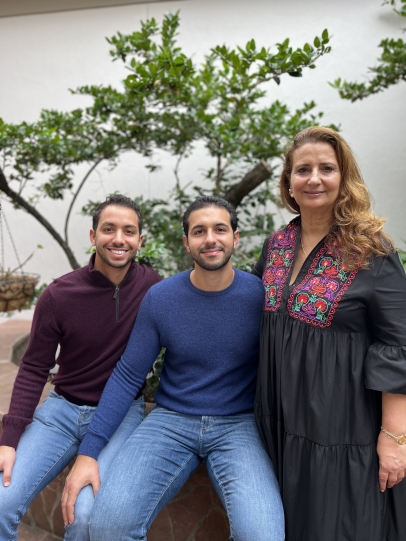Culture Brothers
In 2020, Tunisian-Texans Mansour and Karim Arem, both in their late 20s, launched their food company Zwïta with the production of harissa, Tunisia’s iconic condiment. This thick, spicy paste made from sun-dried peppers, olive oil, garlic, salt, caraway and coriander is a fundamental building block that adds depth and heat to the country’s cuisine.
The brothers descend from a line of strong Tunisian women who’ve guided their culinary views and practices. Although both were born in Houston, they lived part of their childhood in Tunisia and still regularly visit family there. “Our father wanted us to know our roots, where we come from,” says Mansour. The recipes for their products are ones they grew up with, and the company is named to honor their maternal great-grandmother.
Their beloved, hospitable grandmother, Béchira, has been an inspiration, cooking for them throughout their lives. In addition, the brothers credit their parents as huge inf luences, in equal but different ways. “Our mother taught us the importance of food, what it means to a culture and how to make it,” Mansour says. “Our father is an endocrinologist and author who came to the states in the 1970s to practice and do medical research; he encouraged us to think scientifically but keep our romantic ideals. We talk to him all the time about the business and he helps us think things through.”
The idea of creating Zwïta germinated for some time. Both brothers graduated from Cornell University in New York. Mansour earned a master’s degree in Food Science and Technology with a specialization in Fermentation Science, and Karim received a master’s in Operations Research and Information Engineering. After graduating, both worked in New York City, where Mansour enjoyed cooking family recipes for friends, and they became acutely aware that quality Tunisian harissa wasn’t available in the United States.
“Industrially produced harissa is from peppers dried in ovens where they get ‘cooked’ and turn dark,” says Karim. “For true harissa, peppers must be dried slowly in the sun, so they retain their vibrant red color and fresh flavor.”
When COVID-19 shut down New York and Mansour was laid off from his Brooklyn Brewery job, the brothers decided to return to Houston and get serious about their dream of starting a Tunisian food business. While developing plans and processes, Karim continued his job at IBM and Mansour worked as a brewer at Houston's Karbach Brewing Company. In December of 2020, the Zwïta website went live and the perfected batches of three harissa variations — mild, spicy and smoky — were ready for sale.
Although they’d done no serious advertising, interest in their harissas grew, mainly via social media. By summer 2021, both brothers were working full- time on the business. Karim says, “We realized the potential of what we have and that we needed to focus on Zwïta 150 percent.” In 2022 they introduced a new line of products with a zucchini and potato shakshuka, ready to be combined with eggs. Tunisian-style shakshukas are tomato-based vegetable stews that feature poached eggs and include harissa, of course. Two more shakshukas — fava bean and spinach, and eggplant and sweet potato — soon followed.
Their combined food science and data engineering skills have served them well. “We’ve learned so much in the past two years.” Mansour says. “I call it our lab phase because we’ve done so many iterations. We learn by doing and that’s how we’ve optimized our processes. By performing all the steps ourselves, we can see what’s too messy, too time-consuming, too tedious, and we figure out a better way.”
Now that they’re satisfied with the core group of six products (three harissas and three shakshukas), they are focusing their energies on marketing, ramping up production and expanding distribution throughout the U.S.
In addition to making all the products themselves — from rehydrating and grinding peppers to packaging the finished products and fulfilling the orders — the brothers maintain a lively website with recipes and blog posts about Tunisian cuisine. They publish an online newsletter and create Instagram videos featuring themselves and their family joyfully cooking and eating Tunisian dishes. Through these channels, they’ve created an enthusiastic community of fans.
“We’re not just producing food,” Mansour says. “We want to bridge a cultural gap; Tunisian culture is underrepresented and sometimes misrepresented in the U.S. Storytelling through food is fundamental for us; we want to educate people about how our cuisine is unique and delicious and shouldn’t just be grouped with generic Middle Eastern or North African foods and flavors.”
While Tunisian cooking shares ingredients with other regional cuisines, one difference is that dishes feature more heat than those of its neighbors. Spicy peppers (Capsicum annuum), native to the New World, arrived in Tunisia in the 15th century when Muslims and Jews were expelled from Spain and settled on the Cap Bon peninsula. New varieties of peppers were developed there, including baklouti, which are the most common variety used for harissa. The Arem brothers have found that arbol and guajillo chiles from Latin America are extremely close in flavor to the peppers grown in Tunisia.
As a busy crossroads in the Mediterranean world, Tunisia’s history informs its rich culinary heritage. Originally inhabited by nomadic Berbers, it has been occupied by Phoenicians, Romans, Arab Muslims, Sicilian Normans and Ottoman Turks, all of whom contributed to Tunisian foodways. In 1881, France incorporated Tunisia into its colonial sphere as a protectorate; the country gained independence in 1956.
The smallest country in North Africa, Tunisia’s borders contain mountainous areas, deserts, extensive Mediterranean coastline and arable farmland. The region has been an agricultural center since Roman times when it was known as the granary of the empire. In addition to wheat and barley, the country produces beans, figs, grapes, dates, lemons, olives and olive oil. These ingredients along with lamb, fish, poultry and eggs — the most common proteins — combine to create a unique cuisine that features vegetable stews, grilled vegetable salads in olive oil, many variations of couscous and pasta.
Tunisia is second only to Italy in per capita pasta consumption and it produces unique shapes such as the small, flat squares called nwassar. Pasta dishes often incorporate Mediterranean seafood such as red mullet, octopus and cuttlefish in tomato- and harissa-based sauces. Coriander and caraway are commonly used flavorings. A customizable spice blend called tabil comprises coriander, cumin, caraway, red pepper flakes, dried garlic, black pepper, bay leaves, ginger powder, dried mint and salt.
Tunisian sweets can be cookies and crisp pastries made with dates, figs and varieties of nuts. Assidat zgougou is a pudding made from Aleppo pine seeds, flour, sugar and milk, garnished with hazelnuts, almonds or pistachios. French inf luence is demonstrated in the popular street food casse-croûte tounsi, a baguette sandwich stuffed with preserved tuna, vegetables, hard-boiled eggs and harissa. It’s this varied culinary richness that the brothers want to share.
A big step in spreading the word about Tunisian cuisine and their products came in 2022 when Zwïta competed in H-E-B’s Quest for Texas Best food products contest. They won second place. The prize was $15,000 plus the opportunity for placement on H-E-B shelves. “It was an honor that we never expected,” says Karim.
In Tunisia, winning this prize was a big deal, and not only for the Arem family. Their grandparents’ entire village, El Jem, celebrated the brothers, who received lots of coverage by the Tunisian press, including interviews on national TV and radio.
In March 2023, Mansour and Karim unexpectedly lost their grandmother Béchira in El Jem. She was an influential touchstone throughout their lives; she is featured in many of their videos and she loved that Americans were interested in Tunisian foods. “All our recipes are Grandma -approved,” says Mansour. In honor of Béchira’s legacy, the brothers have dedicated themselves to making Zwïta the best it can be, telling their stories through food and bringing the family’s culinary traditions to a larger audience. “We know that’s what she’d want us to do.”
Visit at zwitafoods.com







